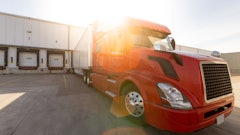Bloomberg: Emboldened by US legislation allowing Maine and Vermont to keep 97,000-pound trucks rumbling on their interstate highways, Kraft Foods Inc. and Home Depot Inc. are pressing more states to follow.
Companies including Kraft, which says its trucks would drive 33 million fewer miles a year with higher weight limits nationwide, say they need to carry loads more efficiently to combat high diesel-fuel prices. Safety advocates say more heavy trucks would accelerate an increase in truck-related accident deaths, and question whether bridges can withstand the added weight.
"You're starting to roll the dice," said Andrew Herrmann, president of the American Society of Civil Engineers. "Do you really want to keep these heavy loads, have a lower factor of safety and start wearing these bridges out faster?"
Trucks can weigh a maximum of 80,000 pounds on interstate highways under US law. Maine and Vermont are exceptions under a pilot program that Congress last month extended for 20 years.
The proposed Safe and Efficient Transportation Act, sponsored by Representative Michael Michaud, a Maine Democrat, would allow every state to decide how extensively 97,000-pound trucks can travel based on economic need and the condition of its roads and bridges.
The bill may be rolled into a multiyear highway policy bill Congress will work on next year, said John Runyan, executive director of the Washington-based Coalition for Transportation Productivity. The group had 120 company members, including Kraft, MillerCoors LLC, International Paper Co., Hershey Co., Owens Corning Inc. and Archer-Daniels-Midland Co., as of Dec. 2. Seventy trade associations also backed the effort.
States are already allowed to set higher weight limits for secondary roads and 44 do, according to Runyan's group. Twenty- eight states also allow a limited number of heavier trucks on interstates by permit, for certain vital commodities or for shipping containers loaded from ports, Runyan said.
Lindsay Chason, senior manager for environmental innovation for Atlanta-based Home Depot Inc., told Georgia's transportation board Oct. 19 that 97,000-pound trucks were needed to keep up with a tripling of congestion since 1982 and diesel-price increases.
The average US retail price for diesel fuel was $3.93 per gallon as of December 5, according to the US Energy Department, up 18 percent from the beginning of the year.
Wisconsin last month passed a package of nine bills intended to loosen various truck size and weight limits. Governor Scott Walker,a Republican, said the new laws would create jobs.
Companies are trying to win higher weight limits rather than the ability to operate longer trucks, like triple trailers, Runyan said. Adding a sixth axle to 97,000-pound trucks on the interstates, as required by Michaud's bill, would reduce road wear and improve braking, he said.
"When you're filling a truck with a product and it's 80 percent filled, you're running around with a lot of trucks with extra space," he said.
Companies can partially offset the heftier trucks' added road wear by keeping the size of the trailer the same and spreading the weight over an additional axle, said Herrmann, head of the engineering group. The extra axle doesn't offset the stress on interstate bridges, which were designed for 80,000- pound trucks, he said.
Herrmann's group estimates that 25 percent of US bridges need weight limits or restrict traffic because they're not strong enough. The US is spending about $10.5 billion a year to maintain bridges, and $17 billion is needed to keep up with the ongoing damage, he said.
"Those bridges already need work," Herrmann said. "Now we're saying let's go back and reinforce all the bridges that need it, when we don't have enough money to maintain the structures that we have."
Kraft, the maker of Cheez Whiz and Oreo cookies, would make 66,000 fewer truck trips if the Safe and Efficient Transportation Act were passed, said Harry Haney, associate director of transportation planning with the Northfield, Illinois-based company. Heavier trucks in Minnesota, Wisconsin, Illinois, Missouri and Ohio would help the company most, he said.
Kraft trucks would drive 33 million fewer miles a year and put 2.1 billion fewer pounds on roads with higher US weight limits, Haney said. The biggest savings would be in shipments of products like Miracle Whip salad dressing, Oscar Meyer meat and Capri Sun juices, he said.
"We need to find ways to use our existing infrastructure more efficiently," Haney said. "Members of Congress increasingly agree."
Congress last month extended a one-year pilot program to allow 100,000-pound trucks on interstates in Maine and Vermont for 20 years, with support from Weyerhaeuser Co. and other forest-products companies.
Trucks are the only transportation mode that logging companies and paper producers can use to carry felled trees, wood chips and biomass from leaves and branches from forests, said Neil Ward, communications director of the Forest Resources Association in Rockville, Maryland.
Minnesota, like Maine, is a border state where industry wants heavier trucks from Canada allowed on the interstates, Ward said. Ohio's legislature is debating higher weight limits to accommodate agricultural products, depending on what Congress does, he said.
"In the cases where a state already has a state limit similar to what we're proposing for the interstate highway, then it's a quick and turnkey operation to get an opt-in" to the proposed House bill, Ward said.
In Minnesota, where a bridge on Interstate 35 collapsed in 2007, killing 13 people, the state transportation department supports allowing either 97,000- or 99,000-pound trucks with six axles on interstate highways, according to a March statement. Interstate bridges are equal to or better than those on state highways where heavy trucks already travel by permit, the agency said.
Maine and Vermont officials downplayed concerns raised by the US Federal Highway Administration about the ability of interstate bridges to stand up under 100,000-pound trucks, according to officials at The Truck Safety Coalition, Parents Against Tired Truckers and Advocates for Highway and Auto Safety. The three safety-advocacy groups obtained documents about the two states' pilot program under the Freedom of Information Act.
"If one assumes that greater than a 10 percent 'overstress' is unacceptable, then these results show that every 100,000 lbs. truck is a problem," a FHWA analysis concluded.
Justin Nisly, a spokesman for the highway administration, declined to comment, saying the agency's analysis wasn't final.
Extra fees proposed for overweight trucks won't cover the costs of reinforcing or rebuilding bridges that weren't designed for the higher weight, with car owners and taxpayers picking up the tab, said John Lannen, executive director of The Truck Safety Coalition, based in Arlington, Virginia.
"The ripple effect will be catastrophic," Lannen said of the pressure on other states to increase weight limits. "The entire country's motoring public will be put in grave danger."
Commercial truck-related fatalities, including people in cars struck by big rigs, rose 8.7 percent in 2010 to 3,675, the National Highway Traffic Safety Administration said Dec. 8. The American Trucking Associations said the same day that 2010 was still among the safest years on record and the trucking fatality rate, adjusted for miles driven, has fallen over the past two decades.
In Pennsylvania, John Rafferty, the Republican chairman of the state's Senate Transportation Committee, and John Wozniak, the panel's senior Democrat, warned the state's congressional delegation that Pennsylvania already needs $3.5 billion a year to upgrade and maintain roads and bridges. More than 5,000 bridges remain structurally deficient, they said in a Nov. 14 letter.
"We cannot afford larger trucks on our roads and bridges," the senators said.
The Safe and Efficient Transportation Act is H.R. 763.
Source: Businessweek.com


















